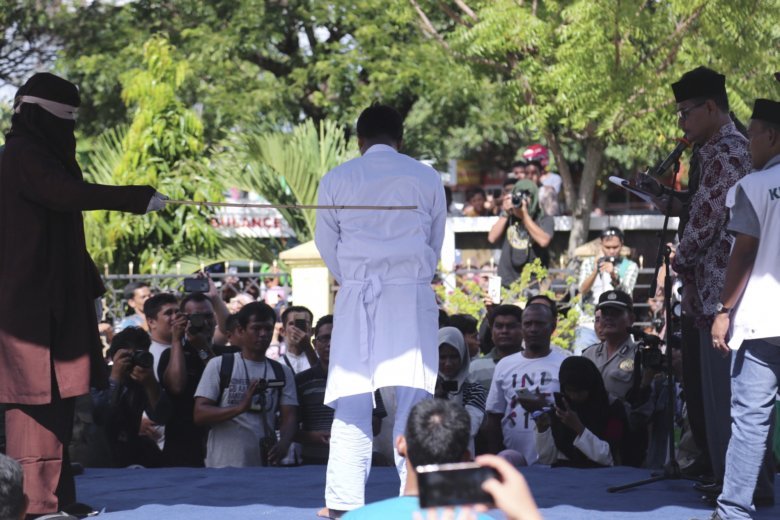|
The Jakarta headline today (July 14, 2018) reads GAY COUPLE CANED IN ACEH. The article begins: “Two Aceh residents, Nyakrab bin Bumin and Muhammad Rustam bin Ramazhan, were publicly caned in Aceh on Friday for being in a same-sex relationship. The gay couple’s caning was held in the yard of the Baiturrahim Ule Lheue Mosque, Banda Aceh, after Friday prayers.” In another article it was reported they had been found by a vigilante group in a “beauty parlor”. That was their sexual transgression. They were thus “found guilty of violating Aceh jimayat’s (Islamic criminal law) Article 63 (1),” said The Jakarta Post. The caning was attended by a thousand spectators who shouted encouragement to “cane them harder.” Following an international outcry after the caning of 2 homosexuals a year ago, it had been declared that there would be no more public canings but that was ignored.
Since the beginning of 2016, LGBT life in Indonesia has been rapidly deteriorating as Islamic fundamentalism moves into the driver’s seat to restore Indonesian national pride. The longer story came to my attention just yesterday when I was handed a copy of a very carefully documented 65 page report by Professor Douglas Sanders, Professor Emeritus, Faculty of Law, University of British Columbia. His report is entitled Indonesia: Stormy Days for LGBT. It was written in December 2016 after a yearlong “unprecedented flood of homophobic statements from Indonesian cabinet ministers … that began early in 2016 … started, it seemed, with statements by the Minister of Technology, Research and Higher Education ….” The Minister was enraged that the University of Indonesia was allowing an unofficial Support Group and Resource Center on Sexuality Studies to have ties to the university. A year and a half after Sanders’s report, the Aceh atrocity shows that things have not improved. Aceh is an autonomous province, and the only one that uses Sharia Law as civil law. Sanders documents how other areas are heading down the same path as Banda Aceh. Although the deterioration of the situation in Indonesia may not have been as fast as Sanders expected, it continues. Sanders describes how space for LGBT people is being narrowed. It is no longer possible to even talk openly about what it means to be “Gay-Lesbi” or to publish anything that might get into the hands of children “and turn them gay”. Advocacy is against the law almost everywhere now, with intimidation sanctioned by local officials as well as mobs. International conferences have been blocked or cut off in the middle of their sessions, and film festivals in embassies have been cancelled “in the interest of public safety.” Even closed support groups are being targeted. In contrast to most other modern countries, Indonesia is preparing to require therapy for anyone who is found to be gay or lesbian. If they are found to have actually committed same-sex acts or to be living a gay lifestyle, the proposed punishments could be imprisonment or death. What is most worrying is how Indonesia has been de-secularizing its Islamic status. It is frighteningly like Israel in that regard. Once models of nominally religious nations that were secular and modern, religious zealots have made surprising progress. Sanders says this is happening in Indonesia partly because the political structure is weak after Suharto's forced resignation as a failure to keep Indonesia economically strong in 1997-8. So now vigilante groups can get away with terrorizing LGBT targets as well as religious minorities. But the drift towards Islamic fundamentalism, and fear of loss of power and status from Western pressure, have pushed politicians to back down from defenses of religious minorities and human rights of women and LGBT. Conservative Islamic parties are bolder than ever and are making gains on every stand they take. Indonesia has also joined (or is leading) the attack on LGBT as the enemy of cultural morality, both universal moral standards as well as those of Indonesia. “All religions oppose LGBT,” is a repeated trope in Indonesia to prove they are in the moral majority worldwide. Sanders mentions that what happens with regard to LGBT rights in the USA gets a lot of attention in Indonesia. The US Supreme Court decision in favor of marriage equality was big news in Indonesia and had an impact. If that progress in the USA continues to be reversed as is happening under the Trump administration and the Republican Congress, it will further encourage the conservatives in Indonesia and around the world. Sanders does not talk about it in this paper, but the fact that Islamic suppression of LGBT and SOGI rights is on the rise in Indonesia will have a dampening effect on the rest of the region. We cannot imagine the Philippines, with the Roman Catholic Church not on our side, coming out as defenders of Pinoy LGBT people if the Muslim population grows even more hardened, as they will as long as Malay and Indo Muslims are going that way. Here in Thailand what Indonesia does is of little concern now that ASEAN is effectually extinct, but what the Islamic South and the influential Islamic communities in the now industrialized areas near Bangkok advocate will have to be listened to when it comes to things like expanding marriage laws in any way to include LGBT couples.
0 Comments
Leave a Reply. |
AuthorRev. Dr. Kenneth Dobson posts his weekly reflections on this blog. Archives
March 2024
Categories |
| Ken Dobson's Queer Ruminations from Thailand |
|

 RSS Feed
RSS Feed
